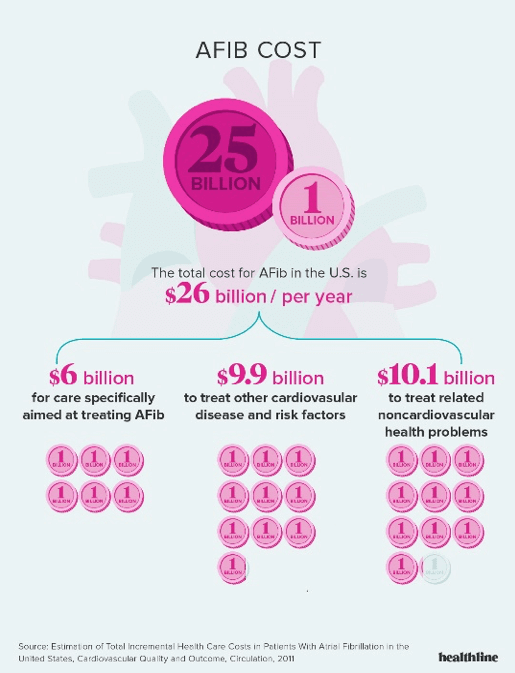Atrial fibrillation (AF) is the most common type of arrhythmia. Currently, AF impacts nearly 5million people in the United States alone and is expected to double by 2035. AF is a silent epidemic that is growing significantly faster than previously expected. The reason for this accelerated growth is primarily driven by two factors. First, an increased aging population—atrial fibrillation prevalence increases from 1-2% in the general population to 8-10% in octogenarians—thus with increased life expectancy the prevalence of AF is also increasing. Second, improved detection—today with more availability of wearable technologies the ability to detect arrhythmias such as atrial fibrillation has exponentially improved—driving the increase in prevalence of the disease.
The Problem by Numbers:
- 33Million estimated global prevalence and increasing.
- More than 5 Million people impacted in US alone
- AF prevalence to double by 2035
- Estimated cost of treating AF in US is $26 Billion
Some people with AF may not experience any symptoms that might alert them to the disease, rather it is detected during a routine visit with their doctor. Others with AF, more commonly experience one or more of these symptoms:
Irregular heartbeat
- Heart palpitations (rapid, fluttering, or pounding)
- Lightheadedness/dizziness
- Extreme fatigue
- Shortness of breath
- Chest pain
- 1/3 of the patients have no symptoms.
If Left Untreated:
- AF increases risk of Stroke by FIVE FOLD1
- 2. AF increases the risk of Heart Failure2
- 3. AF increases the risk of Death 3
- 4. Patients with AF have poorer quality of life4
Treatment: Early Treatment Improves Outcomesand Reduces Risks.
Early intervention and treatment for AF are essential in reducing the risk of stroke, heart failure and in some cases death. There are a variety of treatment options for AF, including medications, procedures such as catheter ablation and even surgical procedures. The right treatment approach should be discussed with your doctor and if needed a referral can be made to discuss options with Cardiac Electrophysiologist (cardiologist that specialize in atrial fibrillation management). Whether you and your doctor decide on one type of treatment or a combination of treatments, research has shown significant results in reducing the number of, or eliminating, AF episodes.
Hetal R. Bhakta, MD
Cardiology/Electrophysiology
Chairman Department of Medicine, DRMC
Director of Electrophysiology and Heart Failure Service, DRMC

